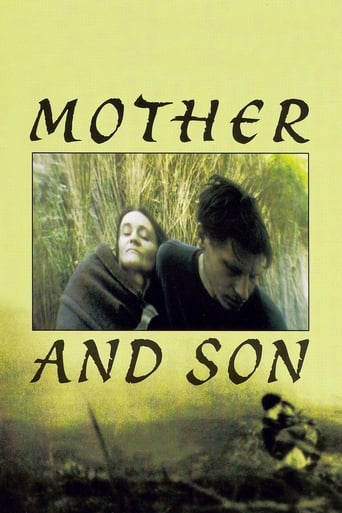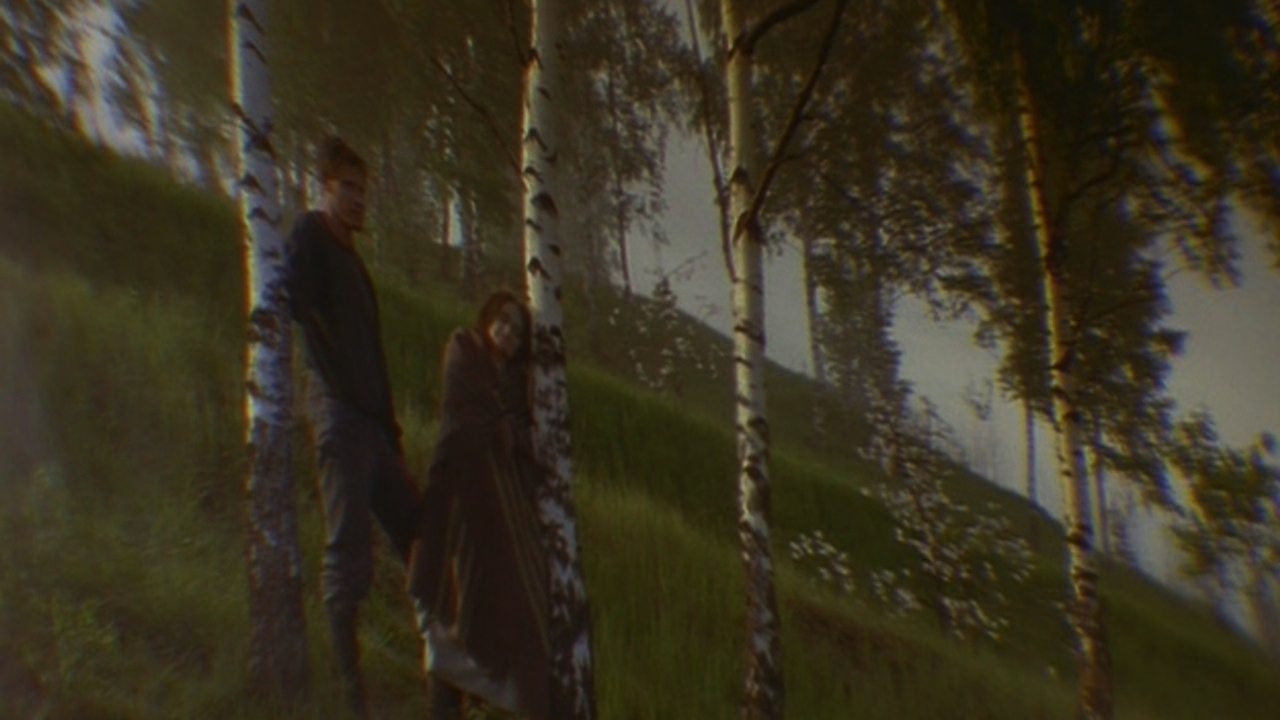jcappy
"Mother and Son" is a film about solitude,self-knowledge, and death; and the contingency of the body as central to each. In other words, it shows that human-ness means an integration between the body and the self; that there is no self apart from the body; and that the love of another must embrace the self /body as one.Sokorov's mother-son intimacy does, I think, occur, but it must be all but non-existent in western culture, especially in its films, and literature. So, it is incredible to view this silent feat.I think much of "Mother and Son's" success lies deeply in what it refuses: modernism, post-modernism, Freudianism, doublespeak (violence is love), cynicism, misogyny, male detachment, and abstract freedom.What "Mother and Son" accepts is an approximate equality between a woman and a man. Yes, it's the son's nurturance which compels our attention, but he's only returning what he's received. What has been her entire life as a mother and teacher, has in this short period of her illness and death, become his life--and he embraces it fully and ordinarily.The mother's and son's mutuality is actually pretty profound. They have the same dream, share the same silences, humor, touch, and gaze. Each takes their cue from the other, compelling each other's attention in face to face, or head to head, communication. They enclose and disclose each other with a kind of certainty which comes both from their shared solitude and their loyal affection.In a certain sense, their companionate relationship bypasses their mother and son roles. Although her concern and worries on his behalf are real, she has in some sense given herself to his care. But not to the care of the family head, not even to the care of a man--his transforming bond with her no doubt severing his bond with men and to male identity--but to the care of an equal who may be as close to her as to a daughter, and whose affection is removed from control and power. Galatians 3:28 reads "there is no male or female," and here in this indeterminate world, removed from public demands and interpretations, this appears possible.But there's no abstraction in this intersubjectivity. The son is not just nurturing; he does what a mother does in these circumstances. He cooks, he keeps house, he deals with all the details; he grooms and cleans his patient; he carries her on walks, and he reads to her from dusty postcards. In short, he looks to her physical and spiritual needs--in a consoling, innovative, and certain manner.It is the very liminality of their present circumstance that enlarges their experience, of one another, and of their own specific lives. (The monastic ideal never vanishes). Poverty, isolation, and illness seem to root them in being, in a fruitful solitude, allowing them an inner quiet to reflect and ponder life's design, their anxiety, and the nature of consciousness.The son's final walk is like a rite of passage. This time he walks, jogs, runs over much of the earlier terrain but now it takes all his courage and honesty because now solo, his course is uncharted. Painful contemplation under ancient tree trunks, gazing out to sea... these seem mother symbols, and spell out a continuity in the discontinuity which is his mother's death. The pilgrim knows through his growing self knowledge that his way will now be hard, but that despair will not take hold. He knows that his dead mother hears his words: "We will meet. Wait for me. Be patient, wait for me."
oudv
The film shows relations of the dying mother, and the son, who is very attached to her, and definitely loves her. What does it show? It shows their living in very poor conditions. It shows how tenderly they "walk" (really he is bringing her). But what do we see further? After their promenade he walks alone at the same places, where they walked together. It is not possible. A person, who love and care about another dying one, would do everything to make the life of this one better. He would not have a free minute to ponder, to be alone with oneself, and if he finds a few minutes a month for that, he would run away from the places where he has usually to be. Another thing. The author devoted this film to Andrey Tarkovsky. We see he learned many Tarkovsky's visual effects. But in Sokurov's film they are only effects, they do not support any senses or mood. Someone has compared this film with "Mirror" ("Zerkalo"). There is nothing common except these visual effects. "Mirror" is a great film and this one is just poor imitation.
gradyharp
Aleksandr Sokurov in MAT I SYN (MOTHER AND SON) has succeeded in capturing those brief, breathing moments that surround death, freezing them in an timeless mold like a shell in a crystal mass, something that goes beyond the passage of time and captures the essence of extended farewells. This brief film is one of the most probing and tender embraces of the meeting/meaning of life and death, of the continuity of a mother's soul in the form of her son, and most important, it is an elegy about the quiet power and beauty of nature.A son (Aleksei Ananishnov) comforts his terminally ill mother (Gudrun Geyer) with gentle caresses, combing her hair, sharing dreams that are identical, and providing solace in every way imaginable. The mother asks for a walk and the son carries her in his arms to a vantage of the sea and through the gnarled trunks of the woods, a path marked by poplars. He carries her back to the little house, and as she sleeps he walks by himself, observing a little train (a departure) in the distance, a sole ship (a departure) gliding on the ocean, and amidst all this natural beauty he clings to an old tree in a tearful embrace. He returns and his mother has died: the cycle of life is complete.Throughout this seemingly simple film Sokorov concentrates on silence, the little dialogue that is spoken is from the gentle script by Yuri Arabov. The 'actors' are appropriately not actors (Ananishnov is a Professor of Mathematics!). The sounds are of nature - rumbling thunder, wind in the trees - and the minimal music is appropriately by Mikhail Glinka and Otmar Nussio with original music by Mikhail Ivanovich. The cinematography by Aleksei Fyodorov is likely greatly influenced by Sokurov's vision: each frame is a still life of nature both with and without the two characters, and with the use of filters, mirrors and broken glass the images are indescribably beautiful. Filmed on the island of Rügen close to the coast of Germany the atmosphere is pure and unhindered by peripheral marks of civilization. Sokurov's 1997 film and his subsequent films OTETS I SYN ('FATHER AND SON') and RUSSKIY KOVCHEG ('RUSSIAN ARK') have established him as one of the most creative filmmakers of today. Highly recommended, especially for those who appreciate art, nature, and the humbling magnificence of the cycle of life.Grady Harp
bring_a_bag_lunch
Rarely does viewing a film become an act of meditation, yet there is a moment in this film when the labored breathing of a dying mother merges with the wind rustling leaves of grass and the shaded breeze swirling through the trees. Elements here harmonize whilst apart but all converge blissfully unto a singularity. Like all films, Mat I Syn has its flaws, but looking back I can only recall it as the minimalist masterpiece that it truly is.I recognize that a film unique as Mat I Syn may not be for everyone, but if received with an open mind and a spirit of calm, the rewards reaped can be plentiful.


 AD
AD
